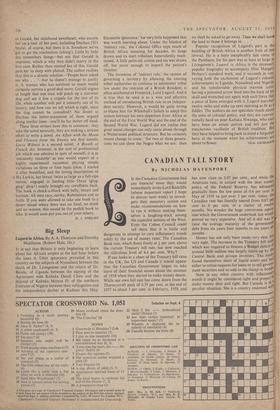Big Sleep
Lugard in Africa. By A. A. Thomson and Dorothy Middleton. (Robert Hale, 18s.) IT is sad that Britain is only beginning to learn about her African empire at the last hour before she loses it. Utter ignorance prevailed in this country on the subjects of Nyasaland between the death of Pr. Livingstone and the return of Dr. Banda; of Uganda between the signing of the Agreement with Kabaka Daudi Chwa and the deposal of Kabaka Mutesa II; of the northern Emirates of Nigeria between their subjugation and the independence durbar at Kaduna this May. Excusable ignorance : for very little happened that was worth learning about. Under the blanket of `indirect rule,' the Colonial Office kept much of British Africa snoozing for decades, its fangs drawn and its inert tribalism benevolently main- tained. A little palm-oil, cotton and tea was drawn off, but never enough to imperil the patient's slumber.
The invention of 'indirect rule,' the system of governing a territory by allowing the existing tribal authorities to continue to administer tribal law under the restraint of a British Resident, is often attributed to Frederick, Lord Lugard. And it is true that he used it as a wise and effective method of introducing British rule to an indepen- dent society. However, it would be quite wrong to blame him for Whitehall's failure to adapt this system between his own departure from Africa at the end of the First World War and the end of the Second World War. Lugard did not realise that great social changes can only come about through a Westernised political structure. But he certainly meant change to come: 'for two or three genera- tions we can show the Negro what we are : then we shall be asked to go away. Then we shall leave the land to those it belongs to. . .
Popular recognition of Lugard's part in the building of British Africa is another fruit of this revival. He is a hero inexplicably late come to the Pantheon, for his part was at least as large as Livingstone's. Lugard in Africa is the necessary popular biography to accompany Miss Margery Perham's standard work, and it succeeds in con- yeying both the excitement of Lugard's colossal achievements in Uganda, Nyasaland and Nigeria, and his unbelievable physical stamina (after having a poisoned arrow fired into the back of his skull and wrenched out again with such force that a piece of bone emerged with it, Lugard marched twelve miles and woke up next morning as fit as a fiddle). The authors do not speculate much about the aims of colonial policy, and they are conven- tionally hard on poor Kabaka Mwanga, who maY have been an astute patriot and not just the treacherous vacillator of British tradition. But they have helped to bring back to mind a forgotten hero, at the moment when his achievements are


































 Previous page
Previous page